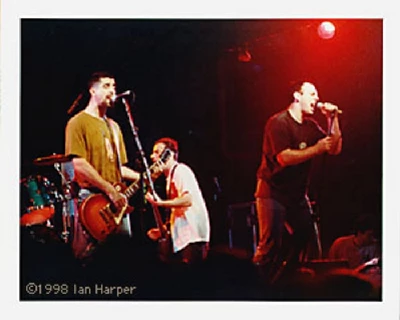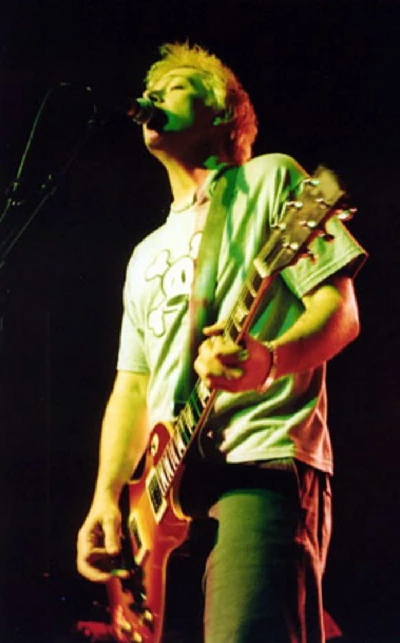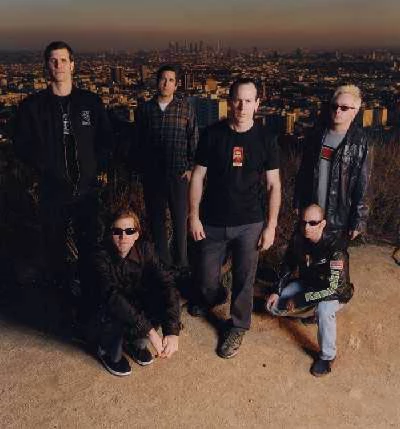published: 18 /
5 /
2004

Now in their 24th year together, hardcore punk outfit Bad Religion are back with a new album, 'The Process of Belief'. Mark Rowland talks to bassist Jay Bentley about how after all this time they keep things fresh, and their recent hip hop influence
Article
For the second time in the space of a month, I was about to phone a member of a legendary 80's punk band. That’s a strange thing to think about just before you’re about to interview someone, but that’s what was going through my head as I dialled the number of Jay Bentley, who’s been the bass player for Bad Religion since their formation in 1980. I’m not a huge fan of talking to people on the phone. It’s a lot easier to get people talking when you’re face to face with them, plus you can usually get people to talk to you for a lot longer than you’re supposed to when they’re right in front of you. It doesn’t help that the phone conversation recorder that I’m using has been playing up recently.
Jay answers the phone after a couple of rings. I try to chat to him a bit before we start the interview, but I got myself worked up a bit about the interview, so I know I sound like a total idiot. Oh well. I pray silently that my recorder will work fine and get on with the interview.
Bad Religion is one of those bands that are still going as strong as they were twenty-odd years ago. Bentley, guitarist Brett Gurewitz and singer Greg Graffin formed the band with original drummer, Jay Lishrout, in 1980. Gurewitz created his own label, Epitaph, to release the band’s material, as in those days of the early 80's labels weren't signing many American punk acts. The band put together a self-titled EP before releasing their first full-length album, ‘How Could Hell Be Any Worse’, in 1982. The band then completely changed direction on 1983's ‘Into the Unknown’, an album that took some of its influences from 70's prog-rock. This didn’t go down well with their fans at the time, and the band has since expressed their dislike for it. Bad Religion didn’t release another album until 1987, when they released what’s considered by many to be their best record, ‘Suffer’. It was on this album that the trademark sound of the band was set in stone – fast, hardcore drumming, punk chords with a melodic lead line from Gurewitz and ex-Circle Jerks guitarist Greg Hetson, socially conscious lyrics, melodic vocals and great harmonies. The band continued to work this sound on their subsequent albums ‘No Control’(1989), ‘Against the Grain (1990)’, and ‘Generator (1992)’. The band was signed to Atlantic records in 1993, and Gurewitz left the band in 1994 to manage Epitaph full-time, as Epitaph bands by that stage had started to become really popular. Bad Religion continued, with one-time Minor Threat Guitarist Brian Baker filling in the space left by Gurewitz.
Gurewitz has since rejoined the band, who recorded the album ‘The Process of Belief (2002)’ with their new three-guitar line-up.
As well as releasing a new album this year, ‘The Empire Strikes First’, the band have also released re-mastered versions of all their early Epitaph records, from ‘How Could Hell Be Any Worse’ to ‘Generator’, with the exception, of course, of ‘Into the Unknown’. Jay says that the reason was purely because they wanted the old albums to stand up next to the albums recorded on more modern technology.
“We just thought, that compared with records that are brought out now, those old records sound pretty crappy. At the time, we were recording our songs in 16 bit studio equipment. Now people use 98 bit technology, which is a bit of a leap forward in recording quality. We thought that we might as well use that new power that you can get with new recording techniques so that our older stuff can sound powerful next to newer records. We had the technology available to us and the money to do it, so we thought that we’d re-issue them with a more powerful modern sound.”
Jay is sure that their earliest albums benefit most from their sonic makeovers, the albums that worked well on vinyl but didn’t translate as well onto CD.
“I think ‘How Could Hell Be Any Worse’ and ‘Suffer’ have come out really well. If you want hear those albums as they’re supposed to be heard, you really have to get a copy on vinyl but obviously these days that’s a lot less accessible. I think that CD technology is striving for the perfection of analogue sound, and though it’s getting closer now, it’s not quite got there yet.”
The re-issues are primarily aimed at the band’s younger fanbase, people who got into the band in more recent years who don’t own the older albums.
“I’m not sure if the re-issues will get us any new fans, but we did think that fans of our stuff now who order our record from our back catalogue would be disappointed if they buy an older record and it sounded crappy. They’d be like: ‘That’s not that powerful, there’s no point getting any of their old stuff.’ At the same time, there will be people who’ve had the old albums for a long time who will say: ‘I got that record and it does sound powerful, you shouldn’t mess around with those recordings now.’ I mean yeah they did sound powerful, in the 80's, but this is 2004. The older albums sound weak and thin compared to more recent albums, so that’s really why we had the old ones re-mastered.”
The band have been together for a whopping 24 years now but the members aren’t feeling bored with the group yet, partly because of the addition of new people at crucial moments in their career. Bad Religion’s newest (and youngest) member is drummer Brooks Wackerman, who has brought his own style of drumming to the band.
“It still feels fresh playing with the band, mainly for me because of Brooks” says Jay. “He really brings in a new element to the band.He’s a really good drummer, he’s not happy just keeping the time, he has to keep playing different songs in different ways, which means that because my role in the band is so connected to the drummer, I’m forced to approach songs in different ways too. I’m not really used to the kind of drummer that Brooks is yet, I’m still more used to just a straight punk drummer, so it’s a challenge for me to try different ways of playing bass, so for me playing in Bad Religion is still interesting.”
It is true that Wackerman is a very good drummer. Listening to the new record, you can hear that he’s one of those drummers that can change tempo in a second. This new element seems to have given Bad Religion the drive to perfect and refine their sound as much as they can, which can certainly be heard on the new record. Greg has said that band members pushed themselves to make the best record they could and the band have experimented with different ways of approaching their trademark sound. Jay believes that some tracks on the album will be a surprise to many fans.
“We worked more of the production side of things with ‘The Empire Strikes First’ than we have with any other record, trying different things. Some of the songs on the new album also aren’t the sort of songs you’d expect to find on a Bad Religion album, but they’re still pretty us. There’s an overture bit that we wrote that we’ve used on this one and there’s a breakdown in the song ‘Let Them Eat War’ which Sage Francis guests on. There’s lots of different elements on this one. We’ve been writing stuff like that for years but we never thought that we’d use them on a record, but now we have, so there you go. Again I think Brooks joining the band has kind of helped us all broaden our horizons a bit, look past straight-ahead punk stuff.”
The album certainly does have a few things that you wouldn’t expect to find on a Bad Religion album before. One thing that is quite surprising is that the band’s sound has a more overtly melodic and poppy sound to it in places. The aforementioned ‘Let Them Eat War’ is one of those tracks. The guitar line, pace and melody is unashamedly punk-pop (in the Husker Du/Descendants sense rather than the "modern punk™ sense), even though the lyrics are quite overtly political. The appearance of Sage Francis on the track is likely to make many BR fans wary, not only because to some they’re selling out their punk roots. Although Sage Francis is an incredibly talented underground rapper, the idea of pairing a rapper with a 24-year-old punk band doesn’t exactly sound promising, especially when considering some of the god-awful rap-rock collaborations that have sprung up in the past. After listening to the track however, you couldn’t be more at ease. Not only is ‘Let Them Eat War’ a great pop tune, it also manages to combine punk and hip hop without it sounding totally embarrassing.
“Brett wanted a breakdown in ‘Let Them Eat War’ way before Sage came on board” Jay explains. “Brooks came up with a brilliant drum beat for it and we decided to get someone else to do something over the top of it. Knowing Brett, I think that the fact that Sage came in to do it was kind of spur of the moment, and when they talked about collaborating it was probably in the middle of a totally different conversation! Sage releases some stuff on Epitaph, so probably Sage and Brett were talking about something else that Sage was gonna release on the label, and Brett would’ve gone ‘By the way, do you wanna work with us? We’ve got this breakdown in one of our songs and it’d be great if you could do something over the top of it.’ Obviously, Sage agreed and did his thing over the top of the breakdown. Brett played us the tape afterwards and it just sounded amazing.”
Bad Religion has a lot of respect for the current underground hip hop scene. Many underground rappers, like the Anticon collective, are doing exactly what BR did in the early 80's – doing everything themselves. Anticon records was put together by a bunch of rappers because no other labels wanted to kno. They needed to create their own medium to release the kind of music they wanted to make. Jay is a big fan of the work that underground hip hop artists do.
“Personally I think that whole underground hip hop scene that Sage Francis is a part of - Anticon and Lexx records stuff like that - produces some of the best music that’s around right now. It’s the future of independent music. It’s the most punk scene that’s around right now. It’s a lot like the scene we came out of. The music coming out of that scene is so creative and those guys have total control over what they do. They do what they want and how they want do it.”
Jay is less impressed by the way the punk scene has gone in recent years, with many commercially minded bands claiming to be punk rock without carrying the same beliefs that were held by the first punk and hardcore bands.
“There are quite a few bands around at the moment that claim to be punk but really don’t have much in common with punk other than a similar sound. I just don’t associate those bands with us. They don’t have any affect on me. There still are some great punk bands out there though, so it’s not all total crap out there.”
By this time, I’m much more at ease. I’ve forgotten about my dodgy recorder (it didn’t record properly, if you were wondering) and am listening intently. Like many people, I love early 80's American punk and to talk to someone who was in the midst of it is fantastic. In the end I have to ask what it was like to be part of a scene that influenced and changed the lives of so many people. Jay thinks for a while before answering the question. It is obvious that the influence of the 80's hardcore punk scene isn’t something he regularly likes to think about.
“When we started in the 80's, no-one who was part of that ever thought that anyone would make a big deal about what we did. We were just a bunch of people who all knew each other who had fun playing music. It was the best thing we could do to entertain ourselves. It was a great time to be in California. We had a lot of fun, but it was never a big serious thing. It’s funny how people see it now. The way that people talk about it like it was some big, important untouchable thing, to us. It’s just what we did while we were growing up.”
Band Links:-
https://badreligion.com/
https://www.facebook.com/badreligion
https://twitter.com/badreligiom
Picture Gallery:-


